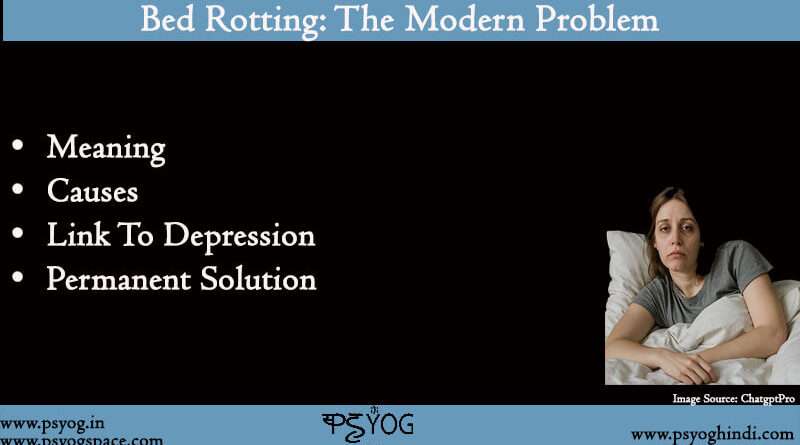Bed Rotting: Meaning, What Is It, Depression Link, How To Stop?
You’ve probably seen the term bed rotting pop up online, often paired with cozy images, memes, or confessions about spending the whole day under the covers. At first glance, it sounds like harmless rest — a digital-age form of self-care. Don’t get tricked, because if we look closely, this isn’t just about rest. Yes, it holds a deep emotional, psychological, and even spiritual implications. The bed rotting meaning goes far beyond laziness. It’s closely tied to how we relate to ourselves, to our thoughts, and to life itself. In this article, we’ll dive into what is bed rotting, how it connects to depression, and how to gently shift out of it without guilt — and with awareness. Or how to stop bed rotting?
Bed Rotting Meaning
The term bed rotting describes a behavior where people choose to stay in bed for long periods while consciously avoiding activity. It doesn’t involve sleeping or physical illness. Instead, it looks like scrolling for hours, zoning out, binge-watching, or lying still while the day slips by. The bed rotting meaning reflects a deeper issue — not just a tired body, but a tired mind. (Read: Nihilism and find purpose in life)
Many people today feel overwhelmed by expectations, speed, and overstimulation. So when the nervous system gets flooded, bed rotting becomes a kind of mental shutdown. It’s a retreat from decision-making, action, and even hope. But while the body may be still, the mind is far from resting — it’s usually overthinking, over-analyzing, or numb. That’s where the true meaning lies: it’s not physical laziness, it’s emotional disconnection.
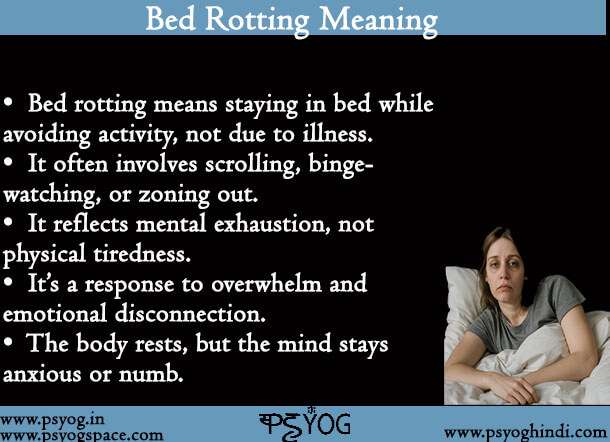
What Is Bed Rotting
So what is bed rotting on a deeper level? It’s what happens when a person becomes so entangled in their own thoughts that they lose the drive to live fully. At its root, bed rotting stems from excessive identification with the “I” — the egoic self. People who are too absorbed in their own story, emotions, and desires often hit a wall. They’re drained not by life itself, but by the weight of their own inner chatter.
All truly great people — whether they were revolutionaries, artists, or spiritual leaders — lived for something bigger than themselves. They weren’t imprisoned by the constant question of “How do I feel today?” or “What do I want right now?” They transcended the ego. But what is bed rotting, if not the result of a life overly focused on the self?
This is not judgment — it’s a quiet truth. When our sense of “I” becomes the center of everything, we become trapped in compulsive thinking. And thought, by nature, thrives on duality. You know happiness because sadness exists. You recognize success only in contrast to failure. This mental duality keeps us spinning, comparing, fearing, and longing. No wonder staying in bed feels like the only escape.
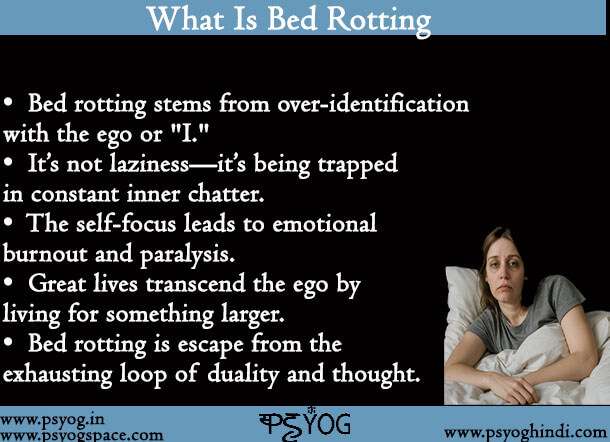
Bed Rotting And Depression
The connection between bed rotting and depression is more than surface-level. While not every case of bed rotting points to clinical depression, many who fall into this pattern are silently struggling. Bed rotting depression happens when the mind becomes a loop — an echo chamber of thoughts like “I can’t,” “What’s the point,” or “Something’s wrong with me.” And the more we believe these thoughts, the more powerless we feel. (Read: People who believe in God, insult him)
Being overly self-focused intensifies this cycle. The ego constantly evaluates itself, compares itself, and creates dissatisfaction. This leads to a sense of emptiness, and soon, even basic things — like brushing your teeth, getting dressed, or stepping outside — feel overwhelming. That’s when bed rotting depression begins to take over your life.
Here’s a deeper truth most people never hear: your sense of identity — the “I” you think you are — is a thought. Try introducing yourself without using a thought. You can’t. This is why we say, “I think, therefore I am.” But what happens when thought itself becomes a trap? You start to feel like your sadness, your failure, your fear — when really, these are just passing mental events. But because you cling to them as you, they control you.
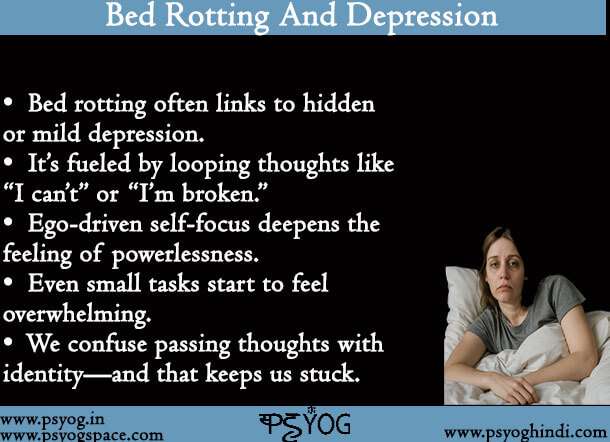
How To Stop Bed Rotting
So how to stop bed rotting? It’s not about shaming yourself into action or forcing productivity. True change starts with gentle awareness. First, recognize that you are not your thoughts. You are the one who notices thoughts. That little shift is the beginning of freedom.
Practically, yes — small steps help. Set one small goal per day. Open the window. Sit in the sun for five minutes. Write down three things you’re grateful for. Keep it simple. These micro-movements can reset your rhythm. But how to stop bed rotting in a lasting way? Sit still — not to scroll or distract — but to observe. Watch your thoughts rise and fall like waves. Don’t chase them. Just watch.
Then, look at your identity. Who are you beyond your job, your sadness, your habits? When you see that your sense of self is constructed by thought, you begin to loosen your grip. And naturally, motivation returns — not because you’re “fixed,” but because you’re no longer running in circles.
This, by the way, is spirituality. Not religion. Not rituals. But the simple recognition that who you think you are is not who you truly are. And in that stillness, healing begins.
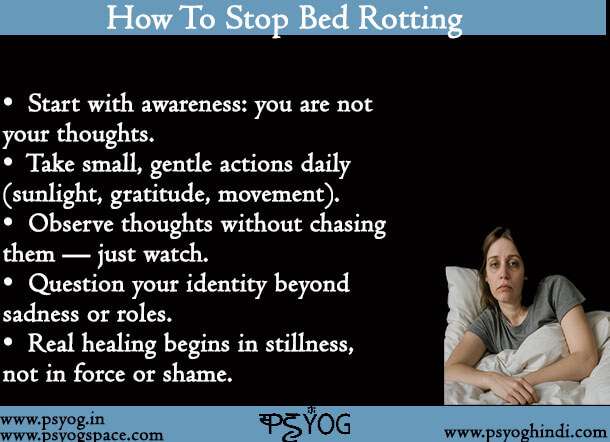
Conclusion
Bed rotting might seem like a modern buzzword, but it’s really a mirror — reflecting our mental patterns, emotional fatigue, and spiritual disconnect. When we unpack the bed rotting meaning, we see that it’s not about rest at all. It’s about escape — from overthinking, from ego, from the heavy idea of “me.”
So what is bed rotting? It’s a moment when the body stops because the mind won’t. And bed rotting depression takes root when we identify too deeply with our mental states. But how to stop bed rotting isn’t about doing more. It’s about being still — not to rot, but to return. To witness the mind’s noise, and slowly rise above it. (Read: Are we heading towards a world war 3?)
In the end, your worth is not tied to your productivity, your feelings, or your story. True energy comes not from forcing movement, but from remembering who you are when you’re not thinking.
FAQs
Is bed rotting a mental illness?
Bed rotting means when a person spends too much time on bed. This is not exactly a mental illness but is a resultof too much self-obsession. When we think too much about ourselves, naturally we lose our life energies and feel drained. As physical beings, our identity is thought bound, hence without thinking, we cannot know who we are.
So self-centric people often have compulsive thinking, which wastes their life energies, and makes them lethargic.
Is bed rotting bad for you?
Of course bed rotting is bad, and it impacts not only our physical but also mental health. Lack of physical activity not only has a negative impact on our organs, but also bones, and our mental health. Lack of physical exercise and too much screen time causes heart problems, lethargy, depression and many other problems.
Is rotting in bed depression?
Depression means when a person has low thoughts for a prolonged period of time and the main reason for that is our mind identification. We create an identity with our mind which is nothing but storehouse of information. And it is this information that creates thoughts, so it can be said that we are thought identified. Once our identity becomes thoughts, we cannot stop thinking and reach a compulsive state, which is known as depression.
How to stop rotting away in bed?
Take small steps to stop bed rotting:
- Make exercise a daily routine
- Join something that you love like dance, art and so on
- Create screen time slots and ensure that you do not look at your screen during other times
- Use your bed only for sleeping, nothing else

